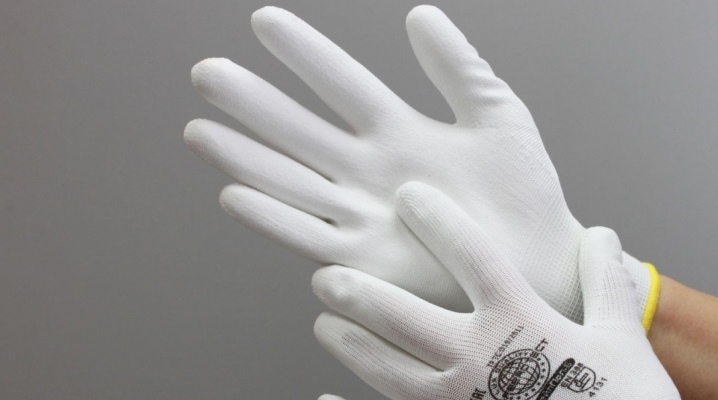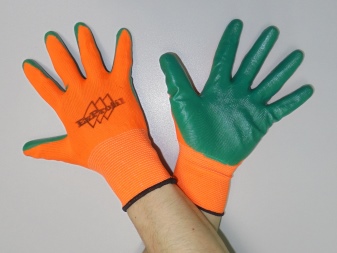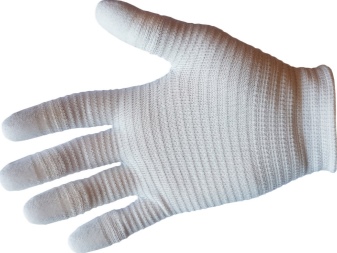How to choose nylon gloves?

Repair work, construction and other activities can harm your hands. Nylon gloves provide reliable protection without sacrificing sensitivity. They will not interfere even with small parts. There are varieties of products with special additives for each type of work.


Description
Nylon is durable and thin. The work gloves are comfortable and lightweight, providing maximum finger sensitivity.
The material is thin, but durable, does not wear off during use. Hands in them do not sweat thanks to the small pores that provide air circulation.

There are many benefits to nylon products.
- Ease, thanks to which a person does not get tired of them.
- Resistance to aggressive external conditions.
- High strength and long service life even with regular heavy loads.
- High elasticity that cotton counterparts do not have.
- Easy care consists in washing the garment at a water temperature of 30 ° C.
- Resistant to chemicals such as alkalis and acids.
- Large assortment of types and colors. White, black and blue models are especially popular.
- Fit the hand, completely repeating its shape.


It should be noted that nylon does not react well to heat and chlorine. When gloves are modified, some types lose their breathability. In this case, hands will sweat during prolonged continuous use of the product. Elastic cuffs prevent the items from slipping off the hands, processing with double cotton thread ensures a secure fit.

Varieties
Nylon gloves are quite thin and durable for small jobs, but additional materials are often used to increase strength: PVC, latex and nitrite. Products are becoming more versatile and cover a wide range of applications. There are several main types of gloves.
- With antistatic agent. The add-on material absorbs static electricity and can work with many materials that generate it. And also gloves are used in contact with products that cannot be exposed to static electricity.


- Nitrile coated. Allows to work with various abrasives. It should be noted that products containing nitrile deteriorate when in contact with solvents. The material simply collapses and is unsuitable for recovery. Gloves of this type are suitable for construction work, allow contact with hydrocarbons.

- Polyurethane coated. PU latex gloves are used for contact with smooth surfaces such as optics and glass. They are able to prevent injury and keep dirt out.

- With polyvinyl chloride and microdot... The additional material ensures high hand sensitivity. PVC gloves are used for precision work, where it is important to feel every little detail. The microdot increases sensitivity, which allows the gloves to be used in antique and food applications.

- Latex coated... These gloves offer maximum versatility. Foam doused products reduce shock loading. Corrugated products provide maximum grip on dry and wet items. High tactile sensitivity allows you to control the entire workflow.

Nylon gloves are great for construction and automotive, repair and painting, summer cottages and handling.
The material is equally good for winter and summer. It should be noted that too high temperatures are contraindicated for nylon. Each type of gloves is designed for specific work, contact with objects that differ in properties.

Criterias of choice
Nylon gloves will be useful to anyone whose activities can lead to injury. They provide hand protection and maximum control over the situation thanks to their tactile sensitivity. Product selection criteria vary by industry.
- Electronic industry. For engineers who come into contact with small parts during the manufacture of microcircuits, gloves with antistatic agents are suitable. Maximum sensitivity will allow you to clearly control the process. In case of contact with chemicals or solder, the worker will not be injured.
- Construction. Excellent application area for PVC nylon gloves. They can be in contact with any finishing materials, even those that have chemical activity. And also gloves are comfortable when cleaning construction debris. Varnish-and-paint work will become much easier, because the substances do not have to be wiped off by hand with solvents. What's more, gloves protect against cuts, splinters and other injuries that often accompany construction activities.
- Medicine and Pharmacology. Suitable for laboratory staff who are forced to come into contact with various reagents. It is also a great way to protect your hands when servicing equipment.
- Agriculture... Used when working with fertilizers, protect hands from chemicals. Gloves will come in handy during the maintenance of various units.
- Car service. This work is closely related to chemicals and petroleum products. Gloves make it much easier to work with oiled parts, ensuring a secure grip. Nylon does not react to gasoline, its contact with the product does not spoil the material.


The jeweler needs gloves that provide maximum tactile sensitivity.
It is important for the builder that gloves protect hands and do not interfere with the full grasp of objects. When working with various electronic parts, you will need very thin anti-static nylon products.
Recommendations for use and care
Nylon gloves are usually not a hassle for their wearers. They can be washed as they become dirty by hand or in the machine at a temperature of 30 ° C. Dry gloves outdoors. Contact with heat sources is prohibited. At high temperatures, the nylon will start to melt.
If cuts or other damage appear on the gloves during use, then it is not safe to use them further. They will no longer be able to provide the required level of protection. Also, contact with chlorine-containing substances and solvents should not be allowed: they destroy the nylon fibers.
How to choose gloves for work, see below.













The comment was sent successfully.